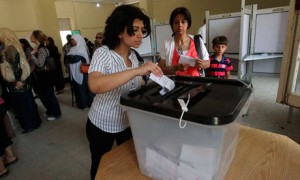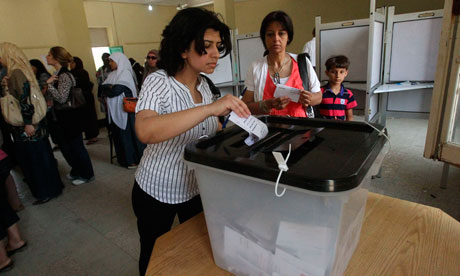
(AFP Photo)
Around 55 mostly local organisations have been granted approval to monitor Egypt’s upcoming parliamentary elections, said Samir Aboul Ma’aty, head of the Supreme Electoral Commission (SEC).
Fifty local organisations with a total 90,000 monitors have been granted approval. Fourteen local organisations were rejected based on criteria announced by the committee.
The four international organisations that have been approved for monitoring are the Carter Centre, the Electoral Institute for Sustainable Democracy in Africa, Democracy International and Arab Election Watch. These four organisations will employ 870 monitors and 120 translators.
Applying to become a candidate in the upcoming elections will run for eight days starting Saturday, 9 March and ending on Saturday, 16 March. Committees will be formed in each governorate in which candidates will apply to run. Each committee will be supervised by the head of the governorate’s court.
After the application period is over, a list of the names of the candidates will be published for three days. Should an applicant not find their name on the list, they can file for appeal between 17 and 23 March. The results of the appeals will be decided between 18 and 30 March.
Following the appeal phase, two final lists will be produced by the SEC; one with the names of the independent candidates and another with the candidates affiliated to a political party.
“We have exerted tremendous effort… There are 40 procedures, each of them has a specific timeframe,” Aboul Ma’aty said. These 40 procedures, he explained, start with President Mohamed Morsi’s call for elections and end with the announcement of the results of the fourth and final phase in late June.
Aboul Ma’aty also announced the conditions by which each candidate must abide during campaigning. For instance, he said, the maximum amount of money a candidate can spend is EGP 1m, and EGP 300,000 more can be spent if the candidate takes part in run-off elections. If a candidate violates one of the listed conditions, the committee has the right to remove them from the electoral race.
President Mohamed Morsi called for the parliamentary elections in February. The elections will be held over four phases, starting in April and ending in June, with the first session of the House of Representatives scheduled to convene in July.
The House of Representatives will be made up of 564 seats; 364 of the seats will be contested through lists and 182 for individuals. This means the legislature will be filled with a ratio of two thirds of candidates from lists and one third individual candidates. Half of the legislature’s seats are reserved for farmers and labourers.

